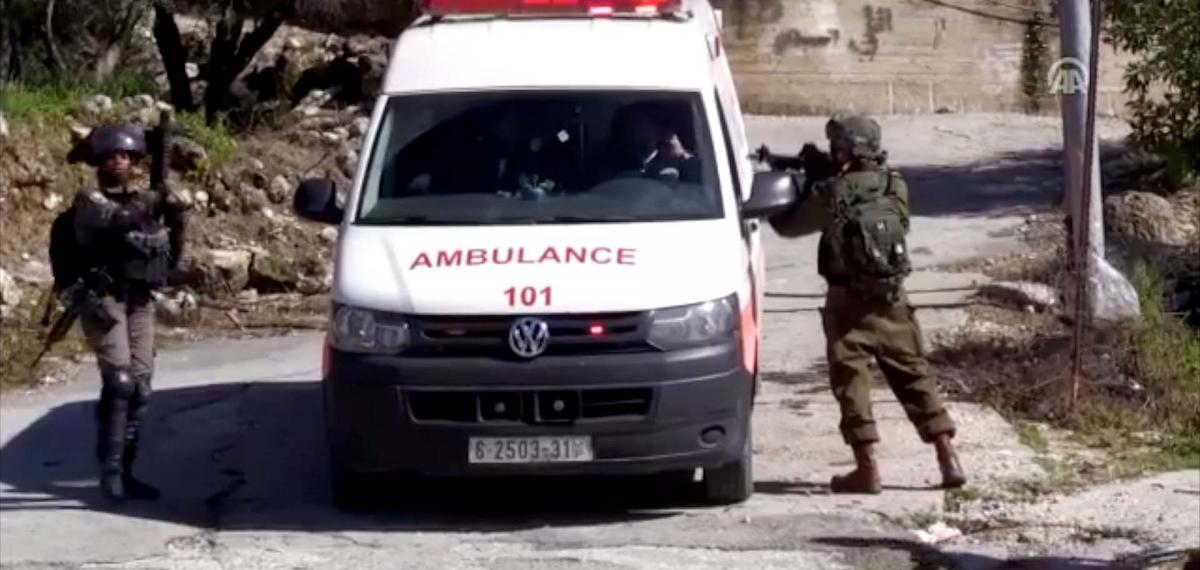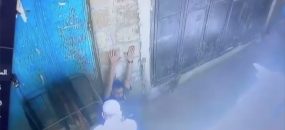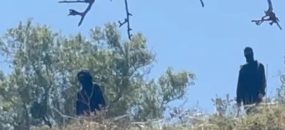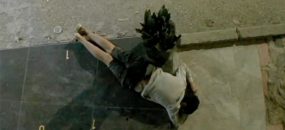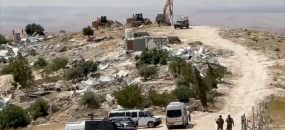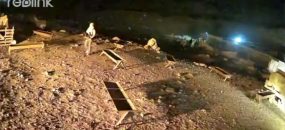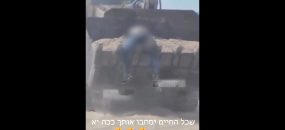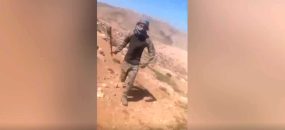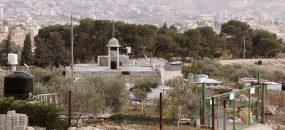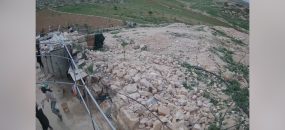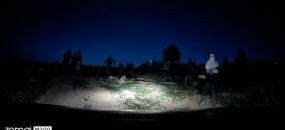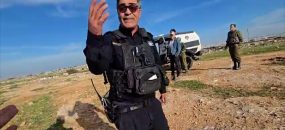Israeli soldiers detain Palestinian ambulance at gunpoint during protest in the village of Beit Sira
On Friday, 8 March 2109, at about 12:30 P.M., a demonstration of about 200 local residents took place in the village of Beit Sira, Ramallah District, to protest the killing of two Palestinians. The two men – Amir Dar Daraj, 21, from Kharbatha al-Misbah, and Yusef ‘Anqawi, 19, from Beit Sira – had been killed a few days earlier after their car struck a military vehicle which had gotten stuck close to the village of Kafr Ni’ma. Their car also hit a military officer and Border Police officer. The demonstrators were also protesting that the military had still not released the young men’s bodies.
About half an hour after the demonstration began, some 20 young men approached the Separation Barrier, torched tires, and attempted to damage the barrier. About 50 soldiers and a number of Border Police officers, stationed approximately 50 meters away from the protesters, fired teargas canisters and rubber-coated metal bullets at the protesters.
Due to the clashes, three ambulances were called to the scene. At about 1:30 P.M., a Red Crescent ambulance crew was treating a protester for teargas inhalation. At that point, the demonstrators began retreating toward the village, and the EMTs found themselves caught between the protesters and the soldiers, on a cul-de-sac leading to some homes. The soldiers, who were about 30 meters away from the ambulance, continued to fire rubber-coated metal bullets and teargas canisters at the retreating demonstrators.
The ambulance driver sought to drive away from that spot. However, as soon as the ambulance started moving, an officer ordered the driver at gunpoint to turn off the engine and hand over the keys. The officer threw the keys on the hood of the ambulance to prevent it from leaving. The driver and another paramedic were forced to wait there for about 15 minutes, until the soldiers moved away. The crew then returned to the village, and continued to provide first aid to the demonstrators until the clashes ended at about 7:00 P.M.
Interfering with the work of medical crews or causing them harm is absolutely prohibited. There were no grounds for threatening, detaining or endangering the EMTs. These actions by the security forces are but another example of their utter disregard for the lives of Palestinians, conduct always carried out with impunity.
Ambulance driver and paramedic ‘Abdallah A’mar, 23, recalled the day’s events in a testimony he gave B’Tselem field research Iyad Hadad on 10 March 2019:
We had been there for more than half an hour when the soldiers began to throw a large number of teargas canisters. The protesters were forced to retreat in the direction of the village homes. One demonstrator was choking after inhaling teargas, and we took him to the ambulance and gave him oxygen. We treated him until he felt better and left. We were now between the demonstrators and the soldiers. The soldiers went on firing teargas canisters and the youths were throwing stones. We decided to move away because we didn’t want to be injured. When I tried to drive off, a military officer and a woman policewoman with the Border Police blocked the way. The officer seemed angry and shouted us in Arabic in a threatening tone: “Shut off the engine! Shut off the engine!” I didn’t understand why he was mad because we hadn’t done anything wrong. I’m just an ambulance driver doing my job. I wasn’t bothering the soldiers or interfering with them in any way.
I tried to signal to him that I wanted to talk to him, to understand what the problem was. But he wouldn’t give me a chance to talk. He just kept on shouting, “Shut off the engine! Shut off the engine!” He came up to my window and pointed his gun with the laser beam at my face. He still looked very angry. He said, “Hand over the keys! Hand over the keys!” I asked him, “What’s wrong? Let’s come to an understanding.” I tried to open the door to get out and talk with him, but he only shouted even more aggressively. I was very scared. I felt he was about to hit me or shoot me. I did as he said, turning off the engine and handing him the keys. The officer took the keys and tossed them onto the hood, outside. Meanwhile the policewoman was talking to my colleague through the window on the other side, but I wasn’t listening to what they were saying.
They left us there, and for a few minutes we had to stay there, caught in the middle between the soldiers and the demonstrators. We had to stay inside the ambulance because we can’t just abandon it. We couldn’t even shut the windows to protect ourselves from the teargas because the windows are powered on electricity, so they can only be operated when the engine is running. Luckily not too much gas got into the ambulance. After about 15 minutes, the soldiers moved away. So I got the keys, and we drove away. We drove into the village and treated other people suffering from teargas inhalation until about 7:00 P.M.
Video footage: Hisham Abu Shaqrah, Anadolu Agency
